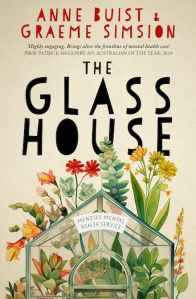We meet Hannah a few weeks after she begins working as a registrar in the Mental Health Services’ Acute Unit at Menzies Hospital.
Acute psychiatry is the emergency medicine of mental health: for the stuff nobody saw coming. Until someone close to them becomes paranoid or overdoses or begins cutting themselves.
We follow Hannah as she finds her feet in this role while working towards her goal of being accepted into the psychiatry training program. Along the way, we’re introduced to Hannah’s colleagues and patients. It’s confronting meeting people experiencing some of the worst moments of their lives and throughout this book you’ll witness what mental health emergencies can look like.
I got off on the wrong foot with Hannah. Her appearing to casually ‘diagnose’ a colleague she barely knows and her blind spot about how beneficial therapy could be for her irked me.
As for getting therapy myself, it’s not at the top of my to do list right now.
Her ability to put off getting therapy surprised me too. The people I know who work as psychologists and social workers all have regular supervision appointments. I expected to be attending the psychiatry equivalent with Hannah, even if she didn’t go to therapy herself, but if this was part of her life she didn’t invite me along.
Hannah slowly grew on me as I made my way through the book but my own bias prevented me from warming to her much. I’ve noticed in my own life that people in helping professions who are hesitant to work on themselves are less likely to be able to sit alongside me as I work on myself. Hannah’s reluctance to do so, while I knew there’d be a reason behind this, meant that I never really trusted her.
It didn’t help that sometimes her judgements about patients and lack of sensitivity infuriated me.
‘How can she bear to be so pathetic?’
This is challenged by a coworker. Thank you, Jon.
Connecting with a main character isn’t essential, though. I’ve liked plenty of books where I didn’t and liking Hannah isn’t necessary to enjoy this book. There are so many other people to meet, both patients and staff.
There were some, like Nash and his clear disregard for the value of social work, that I wanted to steer clear of. Then there were others I wanted to spend all of the book with.
Carey’s insight made me want to get to know them better and I loved Elena’s ability to think and work outside the box. I wanted to go back in time and advocate for Chloe and Brianna.
This book provides a rare glimpse at what working in this field is like, from an insider’s perspective. You feel the pressure of making the right call because the wrong one could result in someone’s death. You witness the struggle to free up beds to work within the parameters of a healthcare system that’s flawed at best. You see the power struggles amongst the staff and are wearied by the politics.
I found it interesting that by beginning the chapters with just a snippet of conversation or a scenario about someone we don’t know yet, it invites you to make a judgement call on what diagnosis the patient will be given, and indeed who the patient will be. It’s easy to start seeing people as diagnoses, not people, like when Nash talks about patients as PD’s (meaning personality disorders), stripping them of their humanity.
I don’t have a problem per se with diagnoses or with appropriate mental health treatment. My bugbear is when peoples’ normal and expected responses to trauma are given a diagnosis that’s then used to discredit their character and reliability. This didn’t play out as much as I expected here but I still cringed whenever a personality disorder was diagnosed.
I kept thinking that this is what a mental health spinoff of 24 Hours in A&E might look like. This book provided mini case studies that ran the gamut of mental health emergencies.
I can see this working well as the first in a series. I’d be interested in watching Hannah grow in both her personal and professional life over time.
Thank you so much to NetGalley and Hachette Australia for the opportunity to read this book.
Once Upon a Blurb
Psychiatry registrar Doctor Hannah Wright, a country girl with a chaotic history, thought she had seen it all in the emergency room. But that was nothing compared to the psychiatric ward at Menzies Hospital.
Hannah must learn on the job in a strained medical system, as she and her fellow trainees deal with the common and the bizarre, the hilarious and the tragic, the treatable and the confronting. Every day brings new patients: Chloe, who has a life-threatening eating disorder; Sian, suffering postpartum psychosis and fighting to keep her baby; and Xavier, the MP whose suicide attempt has an explosive story behind it. All the while, Hannah is trying to figure out herself.
With intelligence, frankness and humour, eminent psychiatrist Anne Buist tells it like it is, while co-writer Graeme Simsion brings the light touch that made The Rosie Project an international bestseller and a respected contribution to the autism conversation.
